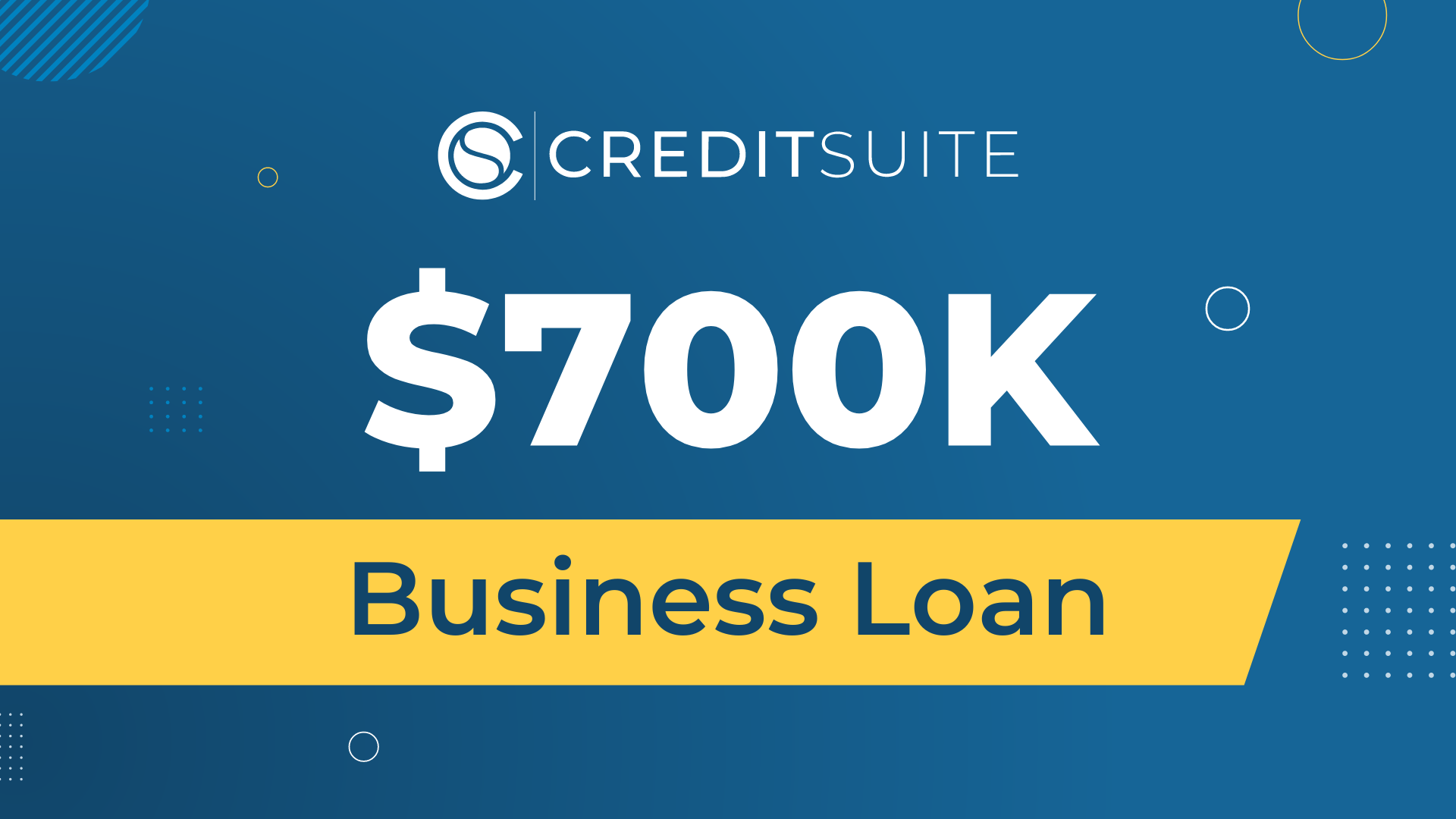Please note: Lending options, rates, and qualifications change regularly. The information in this post is based off of requirements as of original posting date of July 2, 2024.
Acquiring a $700,000 loan for your business marks a noteworthy milestone, and our guide is here to support you through each stage. Choosing the right loan is vital, as each financing option carries its own unique terms and conditions.
As with all types of lending, you need to reach different requirements with the proper Fundability in order to fully qualify. This article is giving you the information you need to understand the starting points for some of the most common types of funding available. Additionally, it’s important to keep maximum approval amounts in mind when searching for funding. You will find each one we touch on in this article have a wide range of maximum limits. But with the correct combination, you have the possibility to reach those funding needs and wants much easier.
The table below has the requirements for each major business loan type.
The Best $700k Business Loans
| Loan Type | Requirements | Approval Difficulty |
| Bank Loan (Term Loan) | Good credit, 2 years in business, business cash flow | Hard |
| Business Line of Credit | Good credit, 2 years in business, business cash flow | Hard |
| SBA Loan | Good credit, 2 years in business, business cash flow | Hard |
| Credit Line Hybrid | Good credit | Easy (No Doc) |
| Business Credit Card | Good credit | Easy |
| Equipment Financing | Good credit | Easy |
| Merchant Cash Advance | Credit card sales, bad credit | Easy |
| Cash Flow Financing | Business cash flow, fair credit | Easy |
How to Qualify for a $700,000 Business Loan
Securing a business loan hinges on six crucial factors. Traditional bank loans demand expertise in these aspects, while alternative funding avenues might provide greater adaptability. These vital elements encompass:
- Personal Credit: Many specialized lenders specializing in small businesses often expect entrepreneurs to uphold strong personal credit scores.
- Business Credit: Developing solid business credit scores and comprehensive profiles can expedite the approval process for obtaining a loan.
- Business Income: In the domain of business finance, securing funds typically necessitates providing proof of income as a fundamental requirement.
- Collateral: Acquiring approval for asset-backed loans, such as car loans, mortgages on business properties, and financing for equipment, typically involves more straightforward procedures.
- Time in Business: Most business lending establishments typically favor working with firms that have a track record spanning two to three years.
- Industry: Even with a solid financial foundation, certain sectors may encounter obstacles in securing approval.

The Best $700k Business Loan Types
Bank Loans (Term Loans)
Business financing from conventional banks is often referred to as “term loans.” These entail regular payments over a specified “term,” typically ranging from 3 to 5 years. Such funding options typically come with fixed interest rates.
Requirements: To qualify for bank term loans, entrepreneurs typically require a strong personal credit background (FICO Scores exceeding 680), at least two years of active business operation, and yearly revenues exceeding $100,000.
Business Line of Credit
Securing approval for business lines of credit, akin to term loans, is commonly offered by traditional banking institutions. While the interest rates may appear appealing, the requirements for eligibility can be rigorous.
Upon approval, you acquire a loan that operates similarly to a credit card, offering versatility for various purposes. A defined credit limit, let’s say $700,000, is established, with incremental payments required to settle the outstanding amount.
Requirements: For small business owners to qualify for business credit lines, they usually require a robust personal credit history (with FICO Scores surpassing 680), a minimum of two years in business operation, and annual revenues exceeding $100,000.
SBA Loans

Blending assistance from traditional banks with government backing, SBA Loans provide advantageous terms and reduced interest rates. Yet, navigating the approval process for these loans can pose some challenges.
There are several SBA loan options to consider, with the 7a and 504 loans being popular choices.
Requirements: For businesses to qualify for SBA loans, they typically need to demonstrate a minimum of one year of operational history, maintain a robust personal credit profile, and satisfy certain revenue benchmarks.
Credit Line Hybrid
Credit Suite offers an innovative option known as the Credit Line Hybrid, ensuring rapid approval for business financing ranging from $10,000 to $150,000, with minimal documentation needed.
Requirements: The Credit Line Hybrid demands a high personal credit score (FICO 680+), catering to startups without history, collateral, or significant cash flow, easing the application process.
Business Credit Cards
Corporate credit cards offer an alternative path for fiscal support, featuring straightforward qualification criteria. Operating much like personal credit cards, they extend a line of credit requiring monthly repayments.
The key difference between corporate and personal credit cards lies in the generally higher credit ceilings available to businesses.
Moreover, creating a credit track record for the company enables business owners to obtain these cards without depending exclusively on their individual credit backgrounds.
Requirements: Commercial credit cards, at their core, demand respectable personal credit. A portion of them necessitate business income standards, yet not every card does.
Equipment Financing

Obtaining equipment financing offers a more straightforward path for qualification than other options.
It entails setting up either a loan or a lease with consistent monthly installments to acquire machinery or substantial equipment. If financing is what you require, especially for a loan to purchase equipment worth $700,000, this option deserves meticulous thought.
Requirements: In exploring equipment financing, possessing a strong personal credit record and a genuine dedication to participate in the process is essential.
Merchant Cash Advance
Utilizing a company’s “merchant processing” mechanism, merchant cash advances manage credit card sales. In such arrangements, the credit standing of the business proprietor and additional elements are deemed less significant.
Once the capital is disbursed, repayment is made automatically, taking a portion of sales, thus removing the need for set payment timelines.
Due to their higher financing expenses, these advances ought to be considered a last resort when the entrepreneur can explore other funding options.
Requirements: A steady flow of monthly revenue from credit card sales, preferably above $10,000, is greatly appreciated. Under such circumstances, possessing credit that’s less than ideal is seen as acceptable.
Cash Flow Financing
Understanding the constraints of merchant cash advances, Credit Suite presents an improved alternative, Cash Flow Financing. This financial solution, akin to merchant cash advances, prioritizes the business’s cash flow as its primary qualification.
However, Cash Flow Financing stands out because it does not confine its eligibility to companies that generate revenue through credit card transactions alone. Rather, it evaluates the entirety of a business’s cash flow sources.
Requirements: Strong cash flow, at least $10,000 per month. Below average credit scores accepted.
Looking for another loan amount? Consider these articles: $900k Business Loan Options, $800k Business Loan Options, $600k Business Loan Options, $500k Business Loan Options, $400k Business Loan Options, $300k Business Loan Options, $250k Business Loan Options, $200k Business Loan Options, $150k Business Loan Options, and $100k Business Loan Options.

